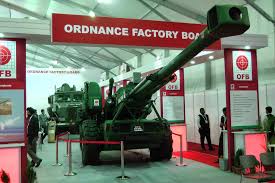Is Private R&D a panacea? Dumping DRDO and OFB is it a solution?

Government and the Yes Masters of the Government wanted to destroy the Government Industries and PSUs. Government will announce something in this regard. Immediately mushrooms of Articles supporting the Government’s decision in this regard. Whether it is Privatisation of Railways, LIC, Public Sector Banks or even the Defence Industry. Many such articles favouring the decision of the Government to Corporatise the OFB has been written and I have countered all these Articles. Now it has become the turn of retired Generals to write Articles against DRDO. One Such Articles was published in Defence News Journal under the title “Time to end DRDO’s monopoly on Defence Research”. According to him the move to Corporatise the Ordnance Factories is a move in the right directions. What is that right direction he has not bothered to inform his reader. He has also written in his article that that time has now come to end the DRDO Monopoly in Research in the field of Armament.
Has anybody stopped Private Industries to undertake Research in Defence R&D? Is it that capability of DRDO is raising eyesore of some segment, as it might help the public sector?
The author must know there is no license required by Private Sector to conduct R&D. Who stops them to score over DRDO in R&D?
The statement of monopoly is used in market context, not in a context of Public Actions. Do we make a statement that Govt monopoly should end over providing Services to people? It is unfortunate that some self-styled intellectuals arise due to their service tag and make some statements to catch the headline.
R & D Spending
Over 80% of the R&D spending in India merely comes from Marquee Research Agencies like DRDO, ISRO, ICAR, Department of Atomic Energy, CSIR etc. Does the author suggest that even that should be closed down when India spends less than 1% of its GDP towards R&D? Israel and Korea are the biggest spenders on R&D at 4.21% and 4.15% of GDP respectively. Japan, Finland and Sweden complete the top 5. World-over a large chunk of the total R&D spent is done by the government and there is a vacuum in private investment. There is no credible evidence of R&D by private sector. FICII has stated its report;there is an immense opportunity for the private sector to enhance its investments in the R&D sector in India.
My Suggestion to the General that, you should have kept the heading, When the poor Track record of Private Sector will end? That way, you would have spoken the truth.
Funding for Indian Industry:
It can be seen that the author might be hinting that finding to be diverted to private industry. MOD has notified ‘Make’ Procedure of capital procurement, in which there is a provision for funding of 90% of development cost by the Government to Indian industry under Make-I category. What stops Private sector to avail this opportunity? The dominant logic is that by killing everything public, only private sector can gain.
Efficiency vs Effectiveness
Is it the efficiency of DRDO that is of concern or effectiveness? The author says, efficiency is the problem area. India R&D is one of the most efficient. That is the reason; many MNCs are putting their R&D base in India. The issue at stake is Effectiveness of Project Management.
When you are planning to choke the DRDO and Public R&D, what you are trying to do is more imports. Is the author suggesting opening the flood gate of imports, as he wants to stop monopoly of DRDO?
Illogical arguments –
I think, the author lacks the clarity as the confusion prevails in the Policy makers, who are more guided by making the right noise than to make a difference.
• By stopping importing, which any way India was not doing, will the Self Reliance go up?
• By stopping the public sector R&D, will the Technology Development get a boost?
This is part of a narrative, everything about the public is bad and every solution lies in solution from private sector for the vested interest, which dramatically is increasing after the retirement of many Generals.
Celebrated ban on imported weapons:
There is a crooked logic; ban on imported weapons can help as a spur to indigenous research and development, provided there is an order by Government, there is a budget by Government to make the purchase and there is a capability of Industry to develop the technology. It may be noted that in DPP 2016, the offset threshold was increased from Rs 300 Crore to Rs 2000 crore, as Indian Industry did not have the capability even to absorb the offset. In such scenario, such high sounding statements may lead to degradation of capability of Indian Armed Forces and in case of failure by Indian Industry; it will lead to a better justification of imports. The sincerity of pronouncement of Government need to be examined , if there is systematic plan for development of technology rather than a blanket ban on imports. A blanket ban on imports only gives a feel good feeling to the Government.
Young Minds can generate new technology?
What a simplistic solution that young minds can generate new technological solutions to the problems faced by the defence forces. Nobody stopped the young talents to contribute in the country. There was no ban on their contribution either.
The foreign OEMs would not be so foolish to set up R&D and incur huge expenditure, had it been so easy to develop the technology. Defence sector works at the front end of fuzzy technology and draws from multiple disciplines, which is beyond the scope of a young researcher.
It may be noted that a platform of iDEX has been created for creation of an ecosystem to foster innovation and technology development in Defence and Aerospace by engaging Industries including MSMEs, Start-ups, Individual Innovators, R&D institutes and Academia and provide them grants/funding and other support to carry out R&D which has potential for future adoption for Indian defence and aerospace needs. Under the iDEX scheme, a maximum of Rs 1.5 crore funding is available to a participant for development of a prototype. More than 700 start-ups participated in 18 problem statements pertaining to National Defence requirements, launched under 3 rounds of Defence India Start-up Challenges (DISC).
58 winners were announced after rigorous evaluation of applications by the High-Powered Selection Committees. Contracts have already been signed with several winners followed by release of tranches for several cases for prototype/ technology development. It seems with retirement, the General has lost touch with reality and staying with his past.
Contribution of the author needed
The author has commented that there is the formidable inertia in the bureaucracies (both civil and military) that neither of these simple suggestions reached anywhere. He should only note that his ideas are foolish.
Let us ask with so many years of Service, how many technologies have been developed by the so called Lt General Eric Vas,and how many patents have been filed? Blaming others is the easiest thing to do. I wish the retired Generals should lead the show by their actions than making such cheap comments.
No problem as alleged with OFB and DRDO
There is no problem in improving efficiency either of DRDO or that of OFB. But, Corporatisation is not a pragmatic consideration, as the nation has to maintain the capability of large life span of defence equipment, spanning for 30-40 years, for which no private sector will be giving continued support. If The Armed Forces would like to get the stretch during the Wars without associated increase in profit margins, if the Armed Forced would like to get the Spares without the minimum Order quantity for commercial consideration, then OFB as a department is the answer.
It has become trendy for many retired Service Officers to think so after their retirement. It is time to examine contribution of so called thinkers about their contribution to technology development during service careers.
Learning from the world
Let us give some academic inputs from a paper titled” Public funding of R&D and its effect on the composition of business R&D expenditure” from BRQ Business Research Quarterly, Volume 17, Issue 1, January–March 2014, Pages 22-30)to validate our arguments that Public sector Role is far more important than the private sector.
• Public subsidies are, together with tax incentives, one of the most used tools for technology policy to stimulate R&D private expenditure
• Public funding, regardless the level of Government grants, positively stimulates R&D expenditure.
• External knowledge acquisition is more likely in those companies that have a higher level of specific assets for the acquisition and assimilation of foreign technology
Private R&D spending is complementary and thus “additional” to public R&D spending, or it is not substitute for Public R&D, which undertakes the Basic Research and leads to development of better scientific base for development of technology.
The argument is DRDO monopoly and consequent reducing its role is Malafide. The diatribe against OFB is unfounded.
As Private sector Spend is very less, it cannot lead the quest for Self-Reliance. Moreover, if the IPR has to remain with Public Sector, it can only ensure Self Reliance. Let Private Sector show its capability in both R&D and manufacturing, but not at the cost of killing or pruning DRDO and OFB.
My request to the Author, for sake of making news or publicity, please refrain from making such cheap statements.
In Armed Forces, if you give a marching order or a firing order, there will be some vivid action on the field, not so in R&D or manufacturing. Your expertise better be limited to your fields in the national interest.
Please think of the larger interest of the nation. Please stay connected with reality. Please stop making loose comments. Thank you General, as it forced me to write , as it will send signals many other Generals of your category.
The views expressed here are those of C.Srikumar, General Secretary of All India Defence Employees Federation and the Convener of AITUC, Public Sector Unions




